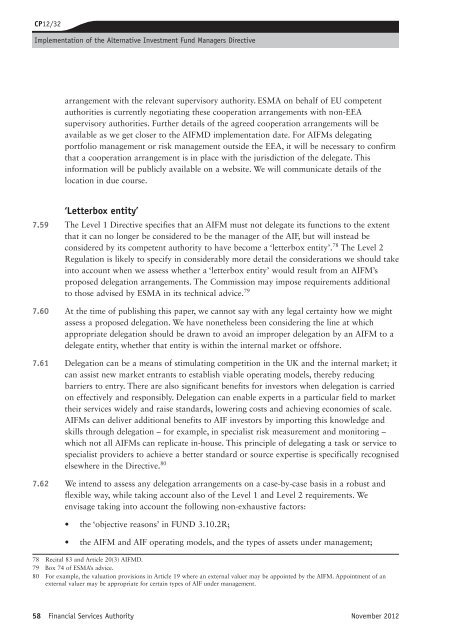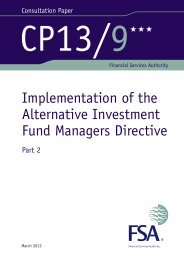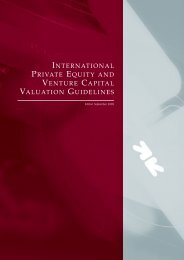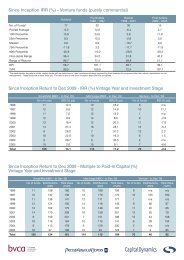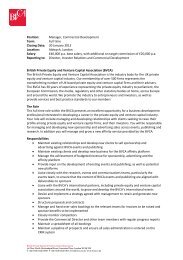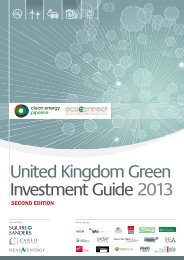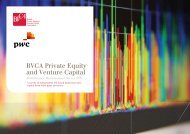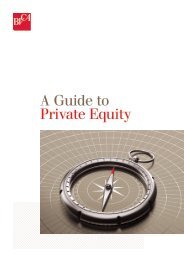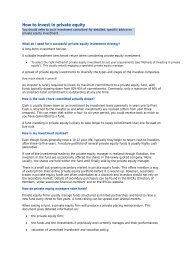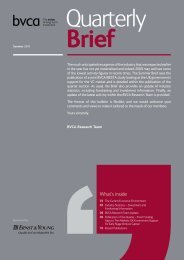CP12/32: Implementation of the Alternative ... - BVCA admin
CP12/32: Implementation of the Alternative ... - BVCA admin
CP12/32: Implementation of the Alternative ... - BVCA admin
You also want an ePaper? Increase the reach of your titles
YUMPU automatically turns print PDFs into web optimized ePapers that Google loves.
<strong>CP12</strong>/<strong>32</strong><br />
<strong>Implementation</strong> <strong>of</strong> <strong>the</strong> <strong>Alternative</strong> Investment Fund Managers Directive<br />
Annex X<br />
arrangement with <strong>the</strong> relevant supervisory authority. ESMA on behalf <strong>of</strong> EU competent<br />
authorities is currently negotiating <strong>the</strong>se cooperation arrangements with non-EEA<br />
supervisory authorities. Fur<strong>the</strong>r details <strong>of</strong> <strong>the</strong> agreed cooperation arrangements will be<br />
available as we get closer to <strong>the</strong> AIFMD implementation date. For AIFMs delegating<br />
portfolio management or risk management outside <strong>the</strong> EEA, it will be necessary to confirm<br />
that a cooperation arrangement is in place with <strong>the</strong> jurisdiction <strong>of</strong> <strong>the</strong> delegate. This<br />
information will be publicly available on a website. We will communicate details <strong>of</strong> <strong>the</strong><br />
location in due course.<br />
‘Letterbox entity’<br />
7.59 The Level 1 Directive specifies that an AIFM must not delegate its functions to <strong>the</strong> extent<br />
that it can no longer be considered to be <strong>the</strong> manager <strong>of</strong> <strong>the</strong> AIF, but will instead be<br />
considered by its competent authority to have become a ‘letterbox entity’. 78 The Level 2<br />
Regulation is likely to specify in considerably more detail <strong>the</strong> considerations we should take<br />
into account when we assess whe<strong>the</strong>r a ‘letterbox entity’ would result from an AIFM’s<br />
proposed delegation arrangements. The Commission may impose requirements additional<br />
to those advised by ESMA in its technical advice. 79<br />
7.60 At <strong>the</strong> time <strong>of</strong> publishing this paper, we cannot say with any legal certainty how we might<br />
assess a proposed delegation. We have none<strong>the</strong>less been considering <strong>the</strong> line at which<br />
appropriate delegation should be drawn to avoid an improper delegation by an AIFM to a<br />
delegate entity, whe<strong>the</strong>r that entity is within <strong>the</strong> internal market or <strong>of</strong>fshore.<br />
7.61 Delegation can be a means <strong>of</strong> stimulating competition in <strong>the</strong> UK and <strong>the</strong> internal market; it<br />
can assist new market entrants to establish viable operating models, <strong>the</strong>reby reducing<br />
barriers to entry. There are also significant benefits for investors when delegation is carried<br />
on effectively and responsibly. Delegation can enable experts in a particular field to market<br />
<strong>the</strong>ir services widely and raise standards, lowering costs and achieving economies <strong>of</strong> scale.<br />
AIFMs can deliver additional benefits to AIF investors by importing this knowledge and<br />
skills through delegation – for example, in specialist risk measurement and monitoring –<br />
which not all AIFMs can replicate in-house. This principle <strong>of</strong> delegating a task or service to<br />
specialist providers to achieve a better standard or source expertise is specifically recognised<br />
elsewhere in <strong>the</strong> Directive. 80<br />
7.62 We intend to assess any delegation arrangements on a case-by-case basis in a robust and<br />
flexible way, while taking account also <strong>of</strong> <strong>the</strong> Level 1 and Level 2 requirements. We<br />
envisage taking into account <strong>the</strong> following non-exhaustive factors:<br />
• <strong>the</strong> ‘objective reasons’ in FUND 3.10.2R;<br />
• <strong>the</strong> AIFM and AIF operating models, and <strong>the</strong> types <strong>of</strong> assets under management;<br />
78 Recital 83 and Article 20(3) AIFMD.<br />
79 Box 74 <strong>of</strong> ESMA’s advice.<br />
80 For example, <strong>the</strong> valuation provisions in Article 19 where an external valuer may be appointed by <strong>the</strong> AIFM. Appointment <strong>of</strong> an<br />
external valuer may be appropriate for certain types <strong>of</strong> AIF under management.<br />
58 Financial Services Authority November 2012


